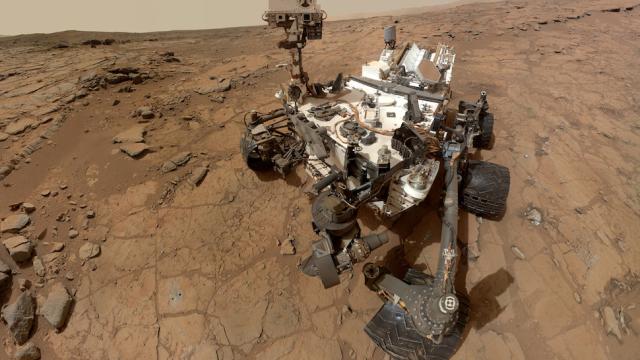Mars is a big boy. At 4.5 billion years old, the Red Planet can surely take care of itself by now — but you wouldn’t know it based on the great lengths NASA and friends go to protect it from contamination by Earthly debris. Some astrobiologists think these measures are unnecessary.
Cornell’s Alberto G. Fairén and Washington State University’s Dirk Schulze-Makuch are two of those dissenting astrobiologists. Earlier this year, they published a manifesto of sorts in Nature Geoscience detailing the futility of our attempts to keep Earth’s germs off of Mars. Their argument hinges on a pretty salient point: “If Earth life cannot thrive on Mars, we don’t need any special cleaning protocol for our spacecraft,” argues Farién, “and if Earth life actually can survive on Mars, it most likely already does, after four billion years of meteoritic transport and four decades of spacecraft investigations not always following sterilisation procedures.”
Beyond the fact that NASA spacecraft are not the only foreign bodies that slam into Mars, it’s impossible to completely sterilise anything we send there. Yet we try. Fairén says that NASA devoted some 10 per cent of the billion dollar budget of the Viking mission toward planetary protection. That’s a lot of money to spend on rubber gloves — or whatever they use to keep spacecraft clean. Plus this planetary protection scheme on Mars is going to seem totally silly when the germ machines called human beings land there in 20 years or so.
It’s worth pointing out here sterilisation is not a simple process. The measures taken for planetary protection actually affect how spacecraft and rovers are designed in the first place. NASA requirements dictate that no surface on the Mars Exploration Rover could contain more than 300,000 bacterial spores, so the technicians building the machine would constantly wipe down the surfaces with alcohol. Boxes of electronics were isolated and sealed off, while any surfaces that was expected to be exposed to the extreme heat of entering the atmosphere weren’t treated. In other words, the process isn’t even entirely consistent, yet it affects how missions are designed and fabricated.
So why are we being so overprotective of Mars? Well, because science wills it so. In a rebuttal to Fairén and Schultze-Makuch’s argument, NASA Planetary Protection Officer (actual job title) Catharine A. Conley claims that sending dirty spaceships to Mars would make it more difficult to distinguish life on Mars from life carried there from Earth. In brief, scientists need to take these planetary protection measures so that they “don’t end up studying their own contamination when searching for extraterrestrial life.” The cost involved with taking these measures just puts greater value on the discoveries they may enable.
Of course, this assumes that life on Mars would somehow resemble life on Earth. We frankly don’t know if it will because, well, we’ve never seen life on Mars before. It’s looking increasingly likely that there was at least life on Mars at one point in time. We’ve already found water in the soil on Mars and just recently found an area that used to be home to a freshwater lake. Life could be just around the corner or, some think, just below the surface. Will we recognise it? We don’t know. Even then, it will always be tough to rule out the possibility that it arrived there on the back of a meteor. But hey, isn’t that what happened with life on Earth too? [Astrobiology]
